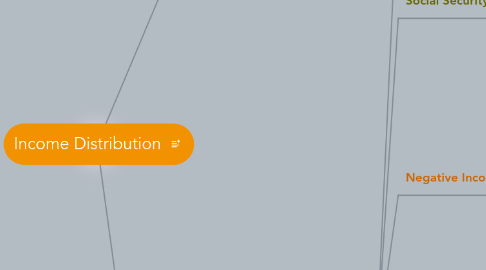
1. Different Political Philosophies
1.1. Libertarian Paternalism
1.1.1. New concept
1.1.2. Idea that people are free to make their own decisions but the "choice architects" should try to improve utility
1.1.2.1. Question : if a specific policy is the best way to change behaviour in order to improve utility but still leave a choice
1.1.2.2. whether Nudges could achieve end result whilst retaining the freedom of choice
1.1.2.2.1. Nudges : details that seem insignificant but if paying attention at them can influence behaviour
1.2. Libertarianism
1.2.1. Society has no income only people earn income
1.2.2. Governments shouldn't redistribute income
1.2.2.1. No group are entitled to control the resources and decide who should get what
1.2.3. Governments should punish crimes-> justice - income distribution should be faire but not equal
1.2.3.1. Equal opportunities
1.3. Liberalism
1.3.1. Laws and Society should be just
1.3.1.1. the policy makers should be object and "behind a veil of ignorance"
1.3.1.2. Raise the welfare of the worst-off person in society - "maximize the minimum criterion"
1.3.2. More equal distribution of income but not total
1.3.2.1. if equal disincentive to work hard - societies tot income falls - and poor worst off
1.3.2.2. differences in income good cause creates incentives to work and improves ability to help the poor
1.3.2.3. Rawl's exp : form of social security in case born in poor family at least fair income distribution
1.3.3. Main Philosopher : John Rawls
1.3.3.1. an experience : what if we decided income distribution before our birth? fairer because examination of every possible case
1.4. Utilitarianism
1.4.1. Happiness for the majority
1.4.2. More equal society more equal income distribution but not totally equal
1.4.2.1. why? cause it discentives
1.4.2.2. If total equality -less work effort so society's total income decreases and utility also
1.4.3. 2 main Philosophers
1.4.3.1. John Stuart Mill
1.4.3.2. Jeremy Bentham
2. Policies to Reduce Poverty
2.1. Minimum Wage
2.1.1. + Helps the working poor without costing the government
2.1.2. -- Can hurt the ones that it wants to help
2.1.2.1. if high minimum wage forces the wage above the supply/demand labour balance so demand for labour drops
2.1.2.1.1. Those employed : Benefit
2.1.2.1.2. Poor unemployed : worst-off
2.2. Social Security
2.2.1. Way to rise the standard of living for poor by supplementing income - for people with low income or that can't work
2.2.1.1. Critics: Creates Bad incentives - people abusing the system- Potential severe problems with benefit system
2.2.1.2. If benefits given to single mothers : the benefit system would encourage the break-up of families
2.2.2. Job seeker's Allowances for people that temporarily don't have a job
2.2.3. Tax credits : pay people with low income if they take a job - creates good incentives to work even if it' s a small wage
2.3. Negative Income Tax
2.3.1. 3 cases
2.3.1.1. High income - pay tax
2.3.1.1.1. example income= 60 000 euro tax due = (1/3 of 60 000) - 10 000 euro = 10 000 so need to pay 10 000 in tax
2.3.1.2. "Medium" income - no need to pay tax
2.3.1.2.1. example income = 30 000 tax due = ( 1/3 of 30 000) -10 000 = 0 so no need to pay tax
2.3.1.3. Low income - income supplemented
2.3.1.3.1. example income = 15000 tax due = (1/3 of 15 000) -10 000 = -5000 so the government gives 5000 euro !!!
2.3.2. Get some money on the basis that you have a low income
2.3.2.1. Doesn't encourage the break-up of families
2.3.2.2. could subsidize lazy people
2.3.2.3. low income doesn't necessarily mean that one needs government support
2.4. In- Kind Transfers
2.4.1. Provides goods and services in order to raise standard of living
2.4.1.1. Different forms
2.4.1.1.1. Charities - food, toys, shelter
2.4.1.1.2. Vouchers to buy food or clothing - free school meals - medical benefits
2.4.1.2. Pros
2.4.1.2.1. ensures that people get the basics
2.4.1.2.2. Doesn't encourage alcohol or drug abuse
2.4.1.3. Cons
2.4.1.3.1. inefficient and can be quite disrespectful
2.4.1.3.2. Government doesn't know what people really want
2.4.1.3.3. The poor will some money can raise their own standards of living
2.4.1.3.4. May give things that people don't want - useless help
2.5. Anti- Poverty Policies and Work incentives
2.5.1. New Deal for young people for unemployed 18-24 and claiming jobseeker's allowance for 6 months
2.5.2. New Deal 25+ programme for those unemployed and claiming jobseeker's allowance for 18 months
2.5.3. Jobseeker's allowance
2.5.3.1. have to be able to start working , actively looking for a job
2.5.3.2. Loose the allowance if refuse a job for no job reason
2.5.4. Poverty trap
2.5.4.1. If a family's income rises - loss the benefits no incentive to increase income- high marginal tax rates - poverty trap
2.5.4.2. Critics of anti-poverty policies claim that social benefits alter work attitude and create a culture of poverty
2.5.5. Dilemma for policy makers
2.5.5.1. Heavy effective marginal tax on poor
2.5.5.2. Expensive anti-Poverty policy paid by tax payers
